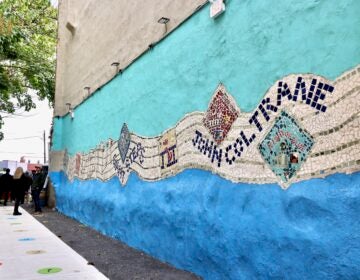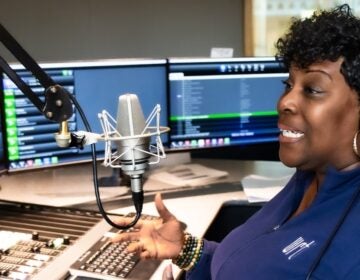Kimmel Center jazz residents focusing on social justice themes
The musicians – guitarist Colton Weatherson, pianist Luke Carlos O’Reilly, and drummer Doug Hirlinger – have outlined composition projects with strong social justice themes.
Listen 2:41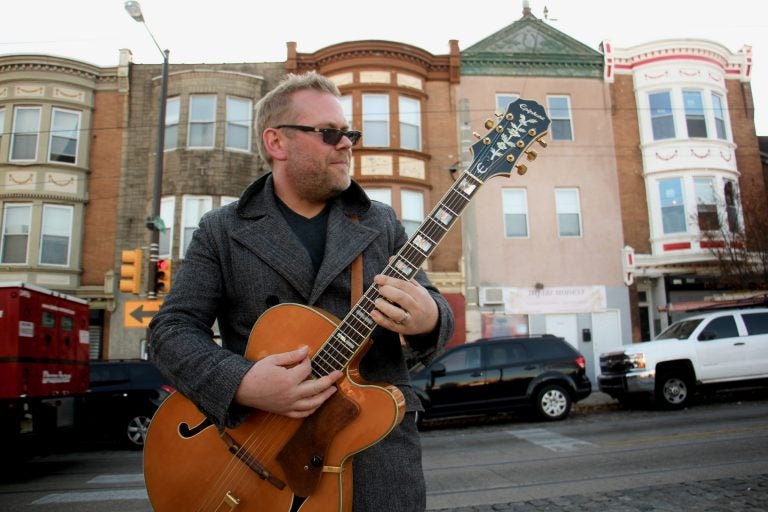
Colton Weatherston is using the diversity of Germantown Avenue as the basis for his composition on the multicultural origins of Jazz. (Emma Lee/WHYY)
There is a historical marker at the corner of Germantown Avenue and Wister Street, in Philadelphia’s Germantown neighborhood, that describes the first anti-slavery protest. It was a document signed by Quakers in 1688 — almost a century before the American Revolution.
“I’m a Quaker. So for me this is sacred space,” said Colton Weatherston, a jazz guitarist. He said his grandfather was born a few blocks from this intersection in 1915. His mother grew up here. Now he lives nearby with his family.
Across a parking lot is a halal pizza shop. Across the street is an Islamic child daycare, a few doors down from Hijabi Modest, a storefront selling headdresses typically worn by some Muslim women.
In this neighborhood, Richard Allen — founder of America’s first African-American denomination, the African Methodist Episcopal Church (AME) — was born. About two centuries later, in 1968, Sun Ra headquartered his galactic, Afro-futurism jazz vision in Germantown.
Weatherston said Germantown Avenue has always been a corridor of cross-cultural exchange. He wants to compose a song suite that uses the avenue to trace the history of jazz as music absorbing myriad cultural and religious influences.
“We can’t close ourselves off from other faith traditions because we would in effect be closing ourselves off from learning something about the meaning of life,” said Weatherston. “The fact there are other kind of faiths are intrinsic to my experience of being a Quaker.”
Weatherston is one of three musicians selected to be part of this year’s Kimmel Center Jazz Residency Program. From now until May, they will be given a small stipend, as well as all the non-monetary resources the center has at its disposal, including access to a wide network of collaborative artists, mentors, and audiences. The residents will perform a series of workshop concerts while they develop their projects.
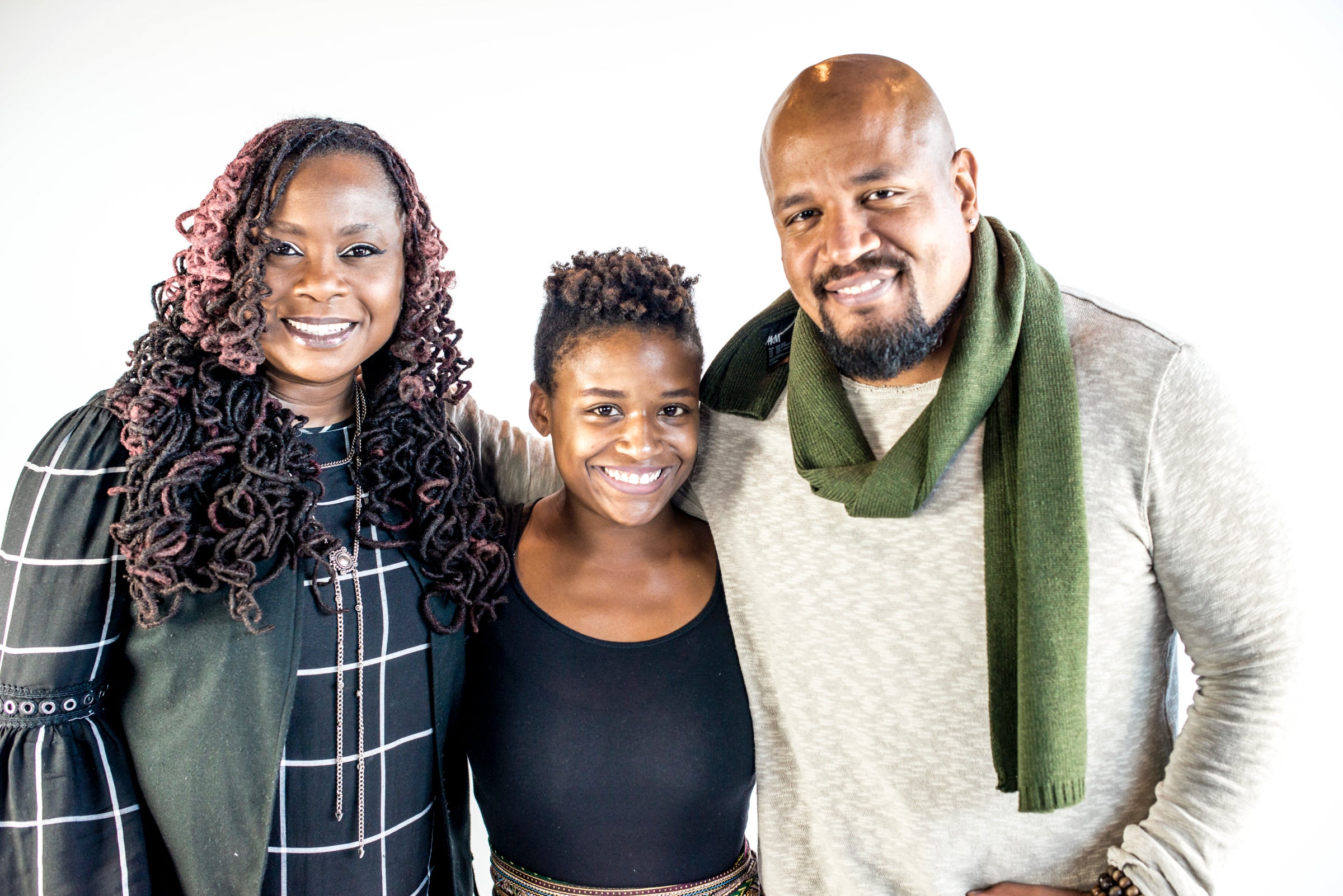
This year, the musicians – Weatherson, pianist Luke Carlos O’Reilly, and drummer Doug Hirlinger – all have outlined composition projects with strong social justice themes.
O’Reilly is a very active performer in the local jazz scene with regular gigs at spots like Time, a jazz restaurant in Center City, and South on North Broad.
He also has a standing weekly gig every Sunday morning at Perfecting Church in Washington Township, New Jersey, a non-denominational church that has what might be the hottest praise band in the region.
During his residency at the Kimmel Center, he will be composing a suite of songs related to the Black Lives Matter movement. He was inspired, in part, by his own experience with police brutality.
In 2008, in Old City, O’Reilly got into an argument with a Philadelphia police officer. O’Reilly is a black man, and a big man – he has a sturdy, muscular frame – and he says because of that, the officer attacked him, beat him, put him in handcuffs while lying on the sidewalk.
He says the details of the officer’s official incident report were false.
“I hadn’t done anything wrong,” he said. “In court it was thrown out because the officer didn’t show up. I was left with abrasions and bleeding, and struck with a nightstick on the ground in handcuffs.”
O’Reilly’s project at the Kimmel Center will be a collaborative one with lyricist Pannan Hewitt and choreographer Sanchel Brown. The music and dance will evolve together over the course of the residency. Together, they will attempt to channel the Black Lives Matter movement.
“It’s tough, because as a Christian I try to let go of anger. Just as human beings it’s not good for us to hold onto those emotions,” said O’Reilly. “But when I’m reminded of it, it brings back those emotions. One of the songs I wrote taps into it. It has anger in it.”
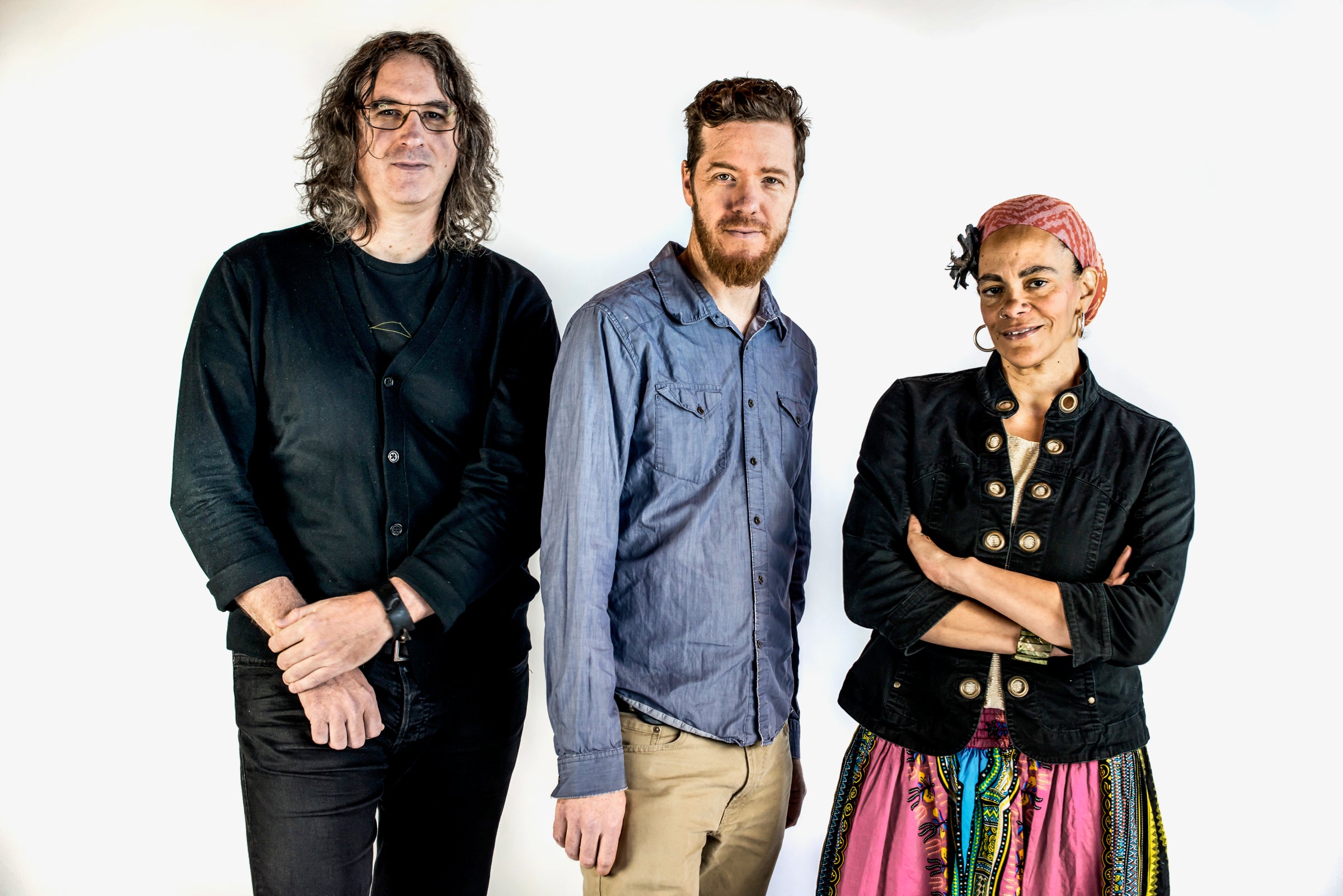
The third artist selected for the Kimmel Residency, Doug Hirlinger, will compose a song cycle about gentrification, collaborating with instrumentalists John Swana and Tim Motzer, lyricist M’Balia Singley, and poet Ursula Rucker.
Hirlinger, originally from St. Louis, has been living alternately in New York and Philadelphia for the last two decades — first moving to Philadelphia in 2001, leaving for New York after 10 years, then five years later relocating back.
Every time he returned to Philadelphia, he saw tremendous change. “That hyper-gentrification you get used to seeing in New York, you’re seeing here now,” he said.
As a starting point for his proposed song cycle for the Kimmel residency, he will take on one example of gentrification: urban equestrian clubs. After seeing an exhibition at the Barnes Foundation by the French artist Mohamed Bourouissa about the Fletcher Street Urban Riding Club, Hirlinger discovered urban horse stables in Southwest Philadelphia and North Philadelphia.
“Those neighborhoods are close to the big changes that are happening in town,” he said. “The city of Philly has ignored them and not taking advantage of them in terms of their value to the city. There’s a good chance they will not last.”
With the urban riding clubs in mind, Hirlinger wants to rethink the classic jazz standard “Stablemates,” written by the Philadelphia saxophone player Benny Golson in 1955. While Hirlinger and his collaborators are rooted in jazz fundamentals — together they play drums, guitar, and horns — they want to push the music with technology. They all dabble in electronics; Hirlinger has been experimenting with using his drum kit to trigger synthesized sounds.
Hirlinger usually plays in other people’s ensembles, rarely if ever with his own outfit. He wants to use the Kimmel Center residency to establish his own sound, one he says will stretch what people understand jazz to be.
“This music wouldn’t typically appear in jazz venues in town. We are veering left of the jazz world,” he said. “This music is gonna be different that what folks are used to hearing at Chris’ or Time or the old Ortlieb’s.”
All three musicians will perform this week, at the outset of the residency, and at several points along their composition process:
Luke Carlos O’Reilly, Tuesday December 5, 8PM
Colton Weatherston, Friday, December 8, 8PM
Doug Hirlinger, Saturday, December 9, 8PM
WHYY is your source for fact-based, in-depth journalism and information. As a nonprofit organization, we rely on financial support from readers like you. Please give today.



